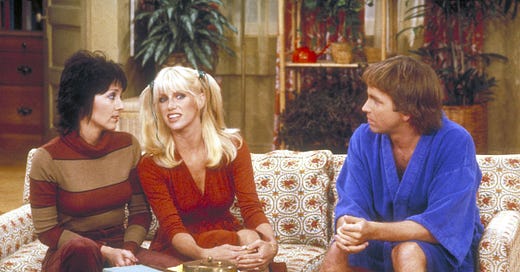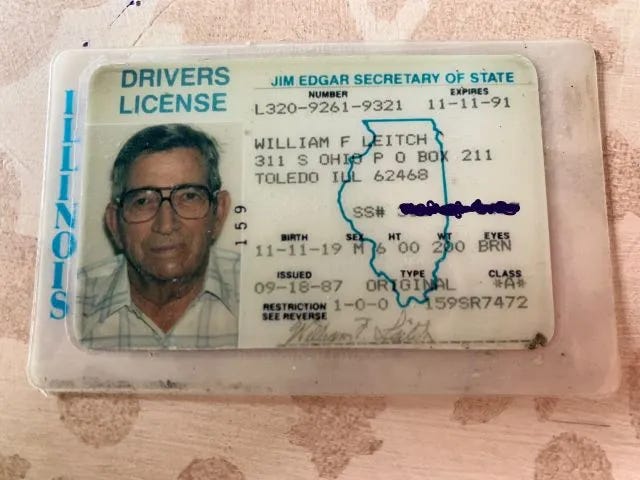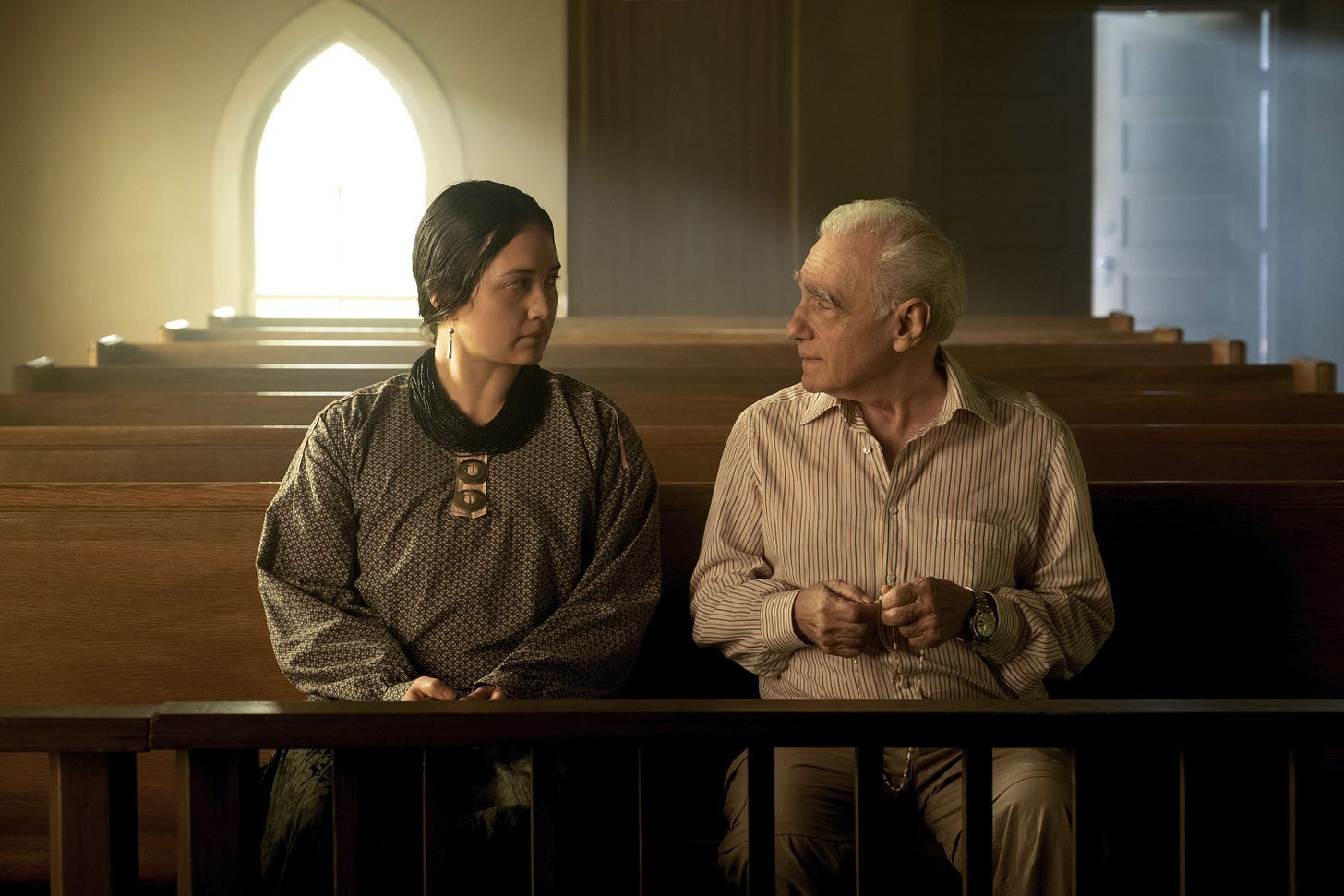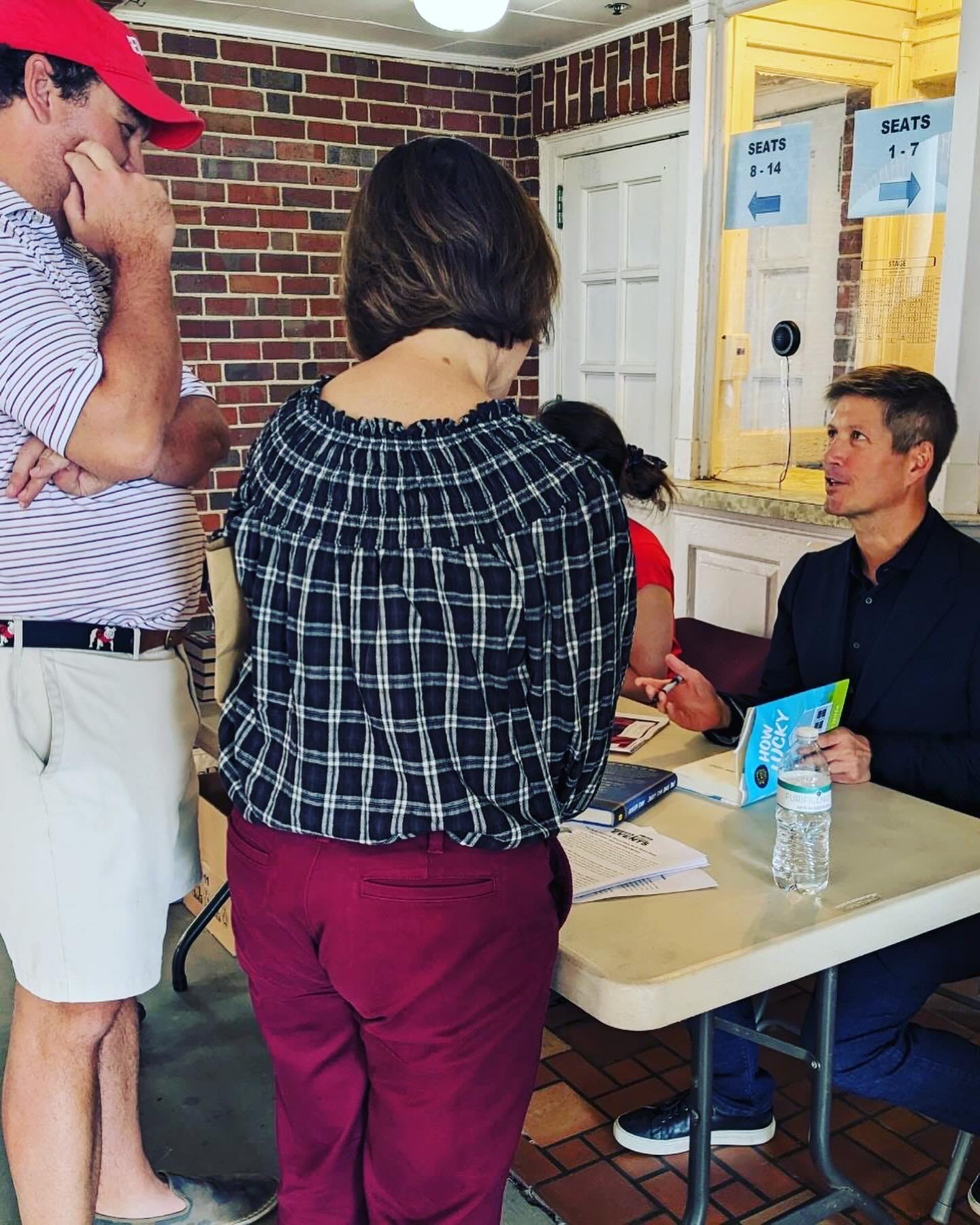Volume 4, Issue 91: Sunlight Ends
"You're the kind of flashing sign that only gets you lost."
Here is a button where you can subscribe to this newsletter now, if you have not previously done so. I do hope that you enjoy it.
Last week, Suzanne Somers died. Suzanne Somers is most famous for playing Chrissy Snow on “Three’s Company,” though that was a little before my time. As a ‘90s kid, I kind of remember her as the mom married to Bobby Ewing on “Step By Step” but mostly as the woman in the Thighmaster commercials, an endorsement that made her tens of millions of dollars and induction into something called the Infomercial Hall of Fame, an institution I’m not entirely persuaded is real but, if it is, also includes Ron Popiel, Sy Sperling and the guy who invented the Chia Pet.
Like most people, I hadn’t thought about Suzanne Somers in many years, and I apparently missed both that she made a pitch a few years ago to pose for Playboy for her 75th birthday (which, in another thing I just discovered, is apparently still possible to do) and that, back in 2005, she responded to bad reviews of her one-woman Broadway show by calling her critics, “Curmudgeons! Maybe I went too close to the bone for them. I was lying there naked, and they decided to kick me and step on me, just like these visions you see in Iraq.” (This was not a popular metaphor to use at the time, or any time since then.) The New York Times called her “an original influencer,” and while I’m not sure that’s how I’d personally like to be remembered, all told, that sounds about right. I knew none of these things about Suzanne Somers when she died because, again, I had not thought about her in years.
But when she died, I, like you, got an alert on my phone about it. I happened to be over at my parents’ place when the alert came through, watching my son Wynn drive around a golf cart over some expensive plants.
“Awww,” I said upon seeing the alert, almost unconsciously, the way you do when you hear vaguely sad news that doesn’t directly affect your life in any real way but still strikes you, at least theoretically, as sad.
“What’s that?” my mom said.
“Oh, Suzanne Somers died,” I said. “The lady from ‘Three’s Company.’”
“Didn’t he die too, the guy on that show?” my dad said, throwing a tennis ball at the dog.
“Yeah, a few years ago,” I said. “I think Joyce DeWitt is the only one still alive now.” (She is.)
“Oh,” Dad said. “How old was she?”
I clicked the link to the story. “She was 76,” I said. “She would have been 77 tomorrow, actually.”
“How’d she die?” my dad asked.
Before I could even answer, my mom’s eyes widened, and she rose up on her front feet.
“Don’t say ‘old age,’” she said. “Don’t say it.”
She had a funny look on her face—a little mad, actually.
Sorta scared, I skimmed the Times piece. “Looks like breast cancer,” I said. “She had it 20 years ago, a little before you did, Mom. Guess it came back?”
My mom grimaced a little.
“No one says ‘old age’ anymore when someone dies,” she said. “They always give a reason now. But when I was a kid, people just died of old age.”
She grimaced a little harder. “And 76 used to be old enough for people to say you ‘died of old age.’”
Both my parents are younger than 76. But I understood what she was saying.
*****************
I carry around my grandfather’s old drivers license with me in my wallet. I was named after him, and when my grandmother, his widow, died in 2015 and we sorted through all the family possessions, I got Grandpa’s drivers license. It was all I wanted. We do, after all, have the same name.
That drivers license was issued on September 18, 1987, two days after his wife’s 67th birthday and roughly a year and half before he died. That picture was taken when the previous William Franklin Leitch was also 67 years old. My grandfather was a hearty man, but he was not a healthy one: He had multiple heart attacks before the age of 50, fought cancer and smoked three packs of unfiltered Pall Malls a day, something he was still doing the last time I saw him, as he lay on his deathbed. I was only 13 when he died, but I will forever remember how this once-strong, powerful man looked at the end—pale, thin, weak, tired. You can see it in the drivers license photo. He was 67 years older. But, to my eyes, he looks much older than that.
My father has lived a much healthier life than his father did, no small thanks to the nurse he has been married to for nearly 55 years. And he looks it. Here he is when he was the age my grandfather was when that picture was taken.
My mother is similarly young, both in appearance and sensibility: She beat breast cancer 20 years ago, gets up to run six miles every morning and is going with me to a rock show next month. They have aches and ailments like everyone else their age, but they are healthy, self-sufficient and just as much in charge of their lives today as they were 30 years ago. Unless a piano falls on their heads tomorrow, they’re not going anywhere.
They are in line with trends with this, of course. The current average life expectancy in the United States is 79.11 years old, which is a full four years older than it was my grandfather died.
It is up in the air whether these trends will continue—my old friend and editor David Wallace-Wells at The New York Times argued last week that America is approaching a “mortality crisis”—but my parents (and for that matter, I) have every reason to believe that they have many, many years ahead of them. But it is one thing to believe that. It is quite another thing to feel it. It is quite another reach the age that, when you were younger, if someone you knew died at that age, people just shrugged and said, “must have been old age.”
Part of this is simply better medicine, and better care. I am sure when many people died in 1900—when the average life expectancy was, er, younger than I am right now—doctors had no better explanation than “old age,” or, if they were feeling like being explicit, something like “exhaustion.” When someone dies at the age of 109, I’m sure there is a specific cause of death on the certification, and it’s probably something like “heart failure” or “chronic respiratory disease.” You can’t find “old age” on the list of the CDC’s top 10 causes of death, after all. But we all understand why they died: They died because they were old.
The totally-cool-to-reference-these-days comedian Louis CK used to have a bit where he discovered that when he turned 52, he’d reached the age where no one would be that surprised if they learned he died. They’d gasp for a second, then look at his age, then look at his body and think, “Yeah, I guess I can see that.” I’ll say that 52 sure seems still like a shockingly young age to me for someone to die, but of course I’d think that: I’m not that far from 52 myself. My high school had its 30th class reunion this year, and apparently, of the 260 people in my graduating class, around 35 had died since 1993. That’s quite a bit above average: The rule of thumb is that you should expect 1 out of every 20 graduates to die by the 30th reunion, 1 out of every 10 by the 40th and 1 out of every 5 by the 40th. But one thing is certain: At every reunion, you’re a little bit less surprised each time you learn someone who was at the last one didn’t make it to this one. What’s the age you reach when people start saying, “yeah, i guess I can see that” when you die? I suspect it’s younger than you want it to be.
Death can’t help but become a little less shocking as you get older. This feels like a blessing, a way our minds and souls adjust to the sadness all around us. If 1 out of every 20 people in a graduating class were to die the year they graduate, there’s probably a serial killer at your school. But add 30 years, well, yeah: I guess I can see that.
This is the adjustment we make as we get older, the adjustment my parents make, the one their parents made, the one I am making, the one my children will someday make. The world becomes more finite, death more palpable, the world around you more fragile. It is not that you adjust to and accept your age. I don’t think people ever do that, no matter what their age is. (I vividly remember once thinking, “I cannot believe I am 27! How did that happen?”) We will always feel younger than we are. The actually-totally-fine-to-reference comedian Nate Bargatze (who is hosting “Saturday Night Live” this weekend and is great) has a bit where, once he turned 40, he realized that he continued thinking he was the same age as everyone he was talking to even when they were 15 years younger than he was. (“In my eyes, we look the same.”) People do not ever act their age because they will always just act like themselves. The character Dorothy in The Time Has Come talks about this.
She supposed that’s how it happened. People didn’t feel like they were old until suddenly, they were. You just keep stacking days together, and each one of them just feels like you being you, and then next thing you know you’re old. Dorothy was in her 30s, and then her 40s, and then her 50s, and she was always still her.
I do not feel like I am 48 now, and when I am 83, if I am lucky enough to be 83, I will not feel 83 either. But that does not change the fact that I will in fact be that age. I will only notice it, absorb the impact of it, when someone else my age dies. It’ll be when someone, like, I dunno, Drew Barrymore (who is eight months older than me) dies, and I think, “wow, what did she die of?”
And before my son can answer, I will snap at him: Don’t you dare say old age.
Here is a numerical breakdown of all the things I wrote this week, in order of what I believe to be their quality.
Banning Palestinian Flags From MLS Matchups Is Just the Beginning, New York. We really are not prepared for what 2024 is going to be like, everyone.
The NBA’s Player Empowerment Era Is Over, New York. It was fun while it lasted. (Kind of. Sometimes.)
Key Storylines For Saturday’s World Series Game 2, MLB.com. That was a blast of a game last night.
Early World Series Storylines, MLB.com. I think this series is going to be great.
Eight Pivotal Players For This World Series, MLB.com. I love that Tommy Pham is in a World Series.
Key Storylines For Tuesday’s LCS Games, MLB.com. I swear, this made sense at the time.
Key Storylines For Monday’s LCS Games, MLB.com. I have no ‘90s rap lyrics for you on this one, sorry.
Key Storylines For Sunday’s LCS Games, MLB.com. OK, fine, my name is Rob and I have a real funky concept.
PODCASTS
Grierson & Leitch, we discussed Martin Scorsese’s “Killers of the Flower Moon,” in depth, as well as “The Pigeon Tunnel” and “In America.”
Waitin' Since Last Saturday, we previewed the Cocktail Party game.
LONG STORY YOU SHOULD READ THIS MORNING … OF THE WEEK
“In the Cities of Killing,” David Remnick, The New Yorker. This just landed this morning.
ONGOING LETTER-WRITING PROJECT!
This is your reminder that if you write me a letter and put it in the mail, I will respond to it with a letter of my own, and send that letter right to you! It really happens! Hundreds of satisfied customers!
Write me at:
Will Leitch
P.O. Box 48
Athens GA 30603
CURRENTLY LISTENING TO
“Cannonball,” The Breeders. It’s the 30th anniversary of this album, which was very much on repeat at the Florida Avenue Residence Halls my freshman year of college. This song is still the canonical example of the chucka-chucka-chucka guitar riff that I loved so much in the ‘90s and wish more songs still had today.
Remember to listen to The Official Will Leitch Newsletter Spotify Playlist, featuring every song ever mentioned in this section.
Also, now there is an Official The Time Has Come Spotify Playlist.
I am about to head to Jacksonville for the World’s Largest Cocktail Party. Spent yesterday in St. Simons, Georgia, in front of a whole bunch of people happy to be in St. Simons, Georgia. I have had a very good time on this book tour and look forward to seeing you all again in two years for the next one.
Best,
Will










What I remember, at my advanced actual age, which tracks precisely with your 'average current American age of death' (birthdate:10/04/1944-late war baby), is, if my memory serves, Suzanne Somers flirting, at the red light, with Richard Dreyfuss, in the goofy gang's back seat, from her cool racy t-bird in the next lane: *American Graffiti*(1963).
Now I'm trying to figure out which guitar riff is the one Will refers to here as chucka-chucka-chucka. Cannonball has lots of different guitar sounds going on, some electric, some acoustic, some bass. Pretty great song.